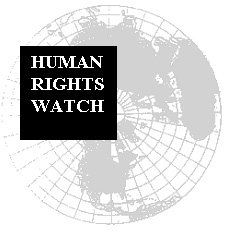All parties involved with the UN plan to resolve the situation of Camp Ashraf residents should work to make sure it is carried out safely and effectively, Human Rights Watch said today. 
“Both Iraqi Prime Minister Nouri al-Maliki and MEK leader Maryam Rajavi have issued statements suggesting they agree, in principle, to the UN plan, but both sides remain far apart on the details,” said Bill Frelick, refugee program director at Human Rights Watch. “Successful implementation of the UN plan requires good faith negotiations by all sides, including the Iraqi government and the leadership of the Mojahedin-e Khalq.”
On December 21, 2011,Maliki announced that the closing of Camp Ashraf would be delayed for six months if the MEK agrees to a Memorandum of Understanding for the relocation of the Camp Ashraf residents. However, a December 20 statement from Rajavi, which also agreed to the transfer in principle, set out conditions that have not been agreed upon. Because of the impasse, the prospect still looms that Iraq will stick to its December 31 deadline and use force to close the camp, raising fears for the safety of the approximately 3,200 residents.
Human Rights Watch sent letters on December 15 and 16, 2011, to the governments of the United States, United Kingdom, France, Germany, Italy, Denmark and Sweden seeking their support for the appeal by Martin Kobler, the United Nations special envoy for Iraq,to the Iraqi government to extend a December 31 deadline for closing Camp Ashraf. Human Rights Watch also urged the governments to help ensure the safe transfer of camp residents for individual refugee status interviews, and respond quickly and positively to UN Secretary General Ban Ki-moon’s call for UN member states to indicate their willingness to accept Camp Ashraf residents for resettlement.
“Resolution of the Camp Ashraf situation requires the active involvement by other major players like the United States and the EU who can play a critical role in resettling Camp Ashraf residents and monitoring to make sure they are safe and are treated fairly,” said Frelick.
The Mojahedin-e Khalq (MEK) was founded in 1965 as an armed group to challenge the Shah of Iran’s government. In 1981, two years after the Iranian revolution, the group went underground after trying to foment an armed uprising against Ayatollah Ruhollah Khomeini, the former Supreme Leader of Iran. After a period of exile in France, most of the group’s leaders relocated to Iraq in 1986 and established Camp Ashraf, although its top leadership remains in France.
Human Rights Watch called on all parties to allow international diplomats, UN agencies, and independent observers to be present to monitor every step of the transfer of these residents to a protected transit site, such as the former Camp Liberty at Baghdad’s international airport. Human Rights Watch also urged the UN to continue monitoring the human rights and humanitarian situation after camp residents have been relocated to the transit site.
Human Rights Watch previously appealed to both the Iraqi government and the leadership of the MEK to cooperate fully with the UN to ensure the protection and safety of Camp Ashraf residents. Tension and mistrust between the MEK leadership and Iraqi security forces remain high following two violent incidents involving Iraqi security forces that led to the deaths of more than 40 Camp Ashraf residents, in July 2009and April 2011. Human Rights Watch has repeatedly called on Iraqi authorities to refrain from using excessive force against Camp Ashraf residents, and for independent and transparent investigations to investigate the two incidents and any crimes committed during them.
The Iraqi government has not opened investigations into these incidents.
The UN Code of Conduct for Law Enforcement Officials states that “law enforcement officials may use force only when strictly necessary and to the extent required for the performance of their duty.” The UN Basic Principles on the Use of Force and Firearms provide that law enforcement officials “shall, as far as possible, apply non-violent means before resorting to the use of force” and may use force “only if other means remain ineffective.” When the use of force is unavoidable, law enforcement officials must “exercise restraint in such use and act in proportion to the seriousness of the offence.”
Human Rights Watch has also called on the Iraqi government not to return the exiles to Iran against their will.
As a state party to the International Covenant on Civil and Political Rights, Iraq is bound to apply the principle of nonrefoulement. The UN’s Human Rights Committee, which interprets the covenant, has explained this obligation[..].
The Iraqi government has assured Washington that it would not forcibly transfer any member of the group to a country where they face a risk of torture.

